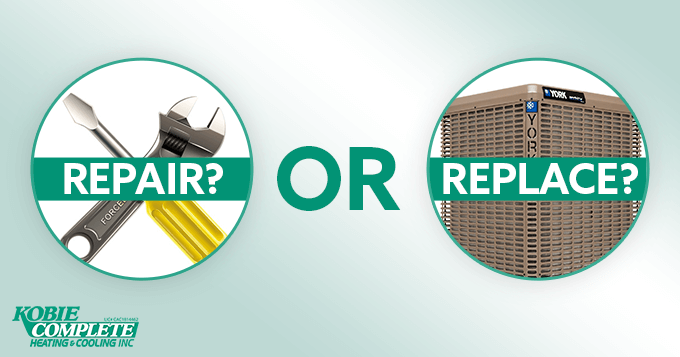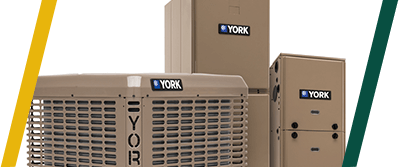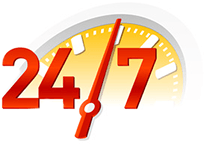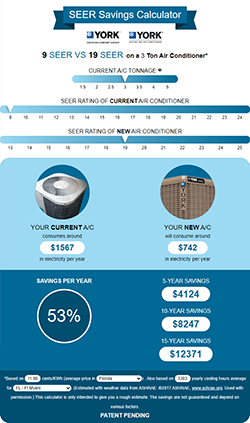
You’re at a crossroads. Your air conditioner has been acting up, prompting you to call your local HVAC contractor for service. After diagnosing the issue, your technician gives you two options. You can either repair your current system, or replace it with a new one. Which option should you choose?
Before you make your decision, there are several factors to consider.
Here are 10 questions to ask yourself before you decide whether an AC repair or replacement is right for you:
1. How Old is Your Current System?
According to the Department of Energy, the average system lifespan for an air conditioner in the United States is 15-20 years. But in Florida, system life expectancy can be much lower. Here, we use our air conditioners almost year-round. Plus, the units are exposed to high humidity levels, saltwater and sulfur which take their toll over time. These factors result in an average lifespan in the neighborhood of 10-12 years.
Some systems last longer, others shorter. The longevity of your system can also depend on other factors such as the quality of the original installation and how well the unit was maintained. But the general rule is that if your system is over ten years old, it’s time to give the replacement option some serious consideration.
2. How Expensive (and Extensive) is the Repair?
Is the necessary repair minor, like clearing a clogged drain line or replacing a busted capacitor? Then the cost of the repair alone not likely high enough to make you consider replacing your system. However, if your air conditioner is over ten years old and the estimated repair bill is close to 50% of its value, replacement begins to make more sense.
Another aspect to consider is how often your current system needs repair work done. Has the unit been running without a hitch, or do you find yourself calling for emergency AC repair service every few months? In the latter case, it would be more cost effective to invest in a new system, rather than continuing to throw money into an old, unreliable unit.
3. Is Your Current Unit Well-Maintained – Or Not So Much?
Proper maintenance has a direct impact on your air conditioner’s reliability, efficiency and life expectancy. In fact, we’ve observed that 50% of all costly AC problems could be avoided just by keeping up with regular maintenance. If you’ve been faithfully doing the following:
- changing the filter (we recommend once every 1-3 months),
- keeping your outdoor unit free of plant growth and debris,
- and calling your local HVAC company for annual tune-ups,
…your AC will operate more efficiently and last longer. But if you’ve neglected regular maintenance, the problems you’re experiencing with your system right now might be a direct result. You may even need to replace the system sooner than would have been necessary had it been properly maintained.
4. How Efficient Is Your Current Air Conditioner?
Do you know your air conditioner’s SEER rating? SEER (Seasonal Energy Efficiency Ratio) represents how efficiently your air conditioner operates. The higher the SEER rating, the less energy the system consumes.
Since January 2023, SEER2 has replaced SEER as the rating system for AC energy efficiency. All new air conditioners installed in the Southern United States must have an efficiency rating of at least 14.3 SEER2 (which is the equivalent of 15 SEER in the old rating system).
If you upgrade your fifteen-year-old 12 SEER unit to a 16 SEER2 unit, you’re looking at a potential cooling cost savings of 40% per year*.
In most cases an air conditioner’s operating efficiency declines with age (or due to poor maintenance — see above). So, after fifteen years, your 12 SEER air conditioner might be operating nearer to a 10-SEER level. This means you could save closer to 68% per year on cooling costs by upgrading to a 16 SEER2 system*. Upgrade to a system with an even higher SEER2 rating and your potential savings will increase.
See for yourself – use our SEER Energy Savings Calculator to learn how much you can save by upgrading to a more efficient air conditioner.
And remember, saving energy not only benefits your wallet, but also the environment.
5. Is Your Air Conditioner Still Running on Freon?
Speaking of the environment, on January 1, 2020, the refrigerant known as R22, HCFC-22 or Freon was officially phased out. This means that both production and import of R-22 is prohibited in the US, making R22 increasingly rarer and more expensive to obtain. The problem is, many old air conditioners still use this obsolete refrigerant. Should your old R22 system develop a refrigerant leak, the only way to recharge it is with recycled R22.
The current standard refrigerant, called R410A or Puron, is more eco-friendly than the ozone-depleting R22. If your system was installed after 2010, chances are you have an R410A system. But if your system is older, it might still be using R22.
6. Is Your Current System Matched?
When you (or a previous homeowner) had your current AC installed, did you replace either the outdoor or indoor unit separately? This plan may seem logical on the surface – especially when one part of the split system is still functional. It probably even saved some money initially. But replacing only the condenser or only the air handler can result in an equipment mismatch. Like an odd couple, these two units were not made to work together and are sure to cause trouble down the road. In short, a mismatched system can result in reduced operating efficiency and shortened lifespan. It will even void the warranty on the new component.
If your current air conditioner is mismatched, we recommend replacing it with a matched system.
7. Is Your Current System Meeting Your Home Comfort Needs?
Prior to the incident that lead you to call for AC repair, were you satisfied with your air conditioner’s performance? If your system has been…
- struggling to keep up with the cooling (or heating) demand,
- not cooling/heating evenly,
- not dehumidifying properly,
- or if your cooling costs are too high,
…it’s time to consider replacing your unit. Your system might be over- or under-sized or mismatched (see above). Or, you might be a candidate for newer home comfort innovations like a zoning system or variable speed technology.
8. Could You Benefit from New Technology?
As we alluded to above, air conditioning technology has advanced in recent years. And depending on your needs and budget, some of these new-fangled innovations might be right up your alley.
For example, two-stage and variable speed technology allows precise temperature and humidity control. Communicating systems continuously monitor your air conditioner’s performance. They can remind you when it’s time to change your air filter or clean the condenser. The system can even notify your chosen HVAC technician if the unit needs service. Also, smart thermostats allow you to control the temperature in your home from your smartphone. Some can even adjust the temperature automatically when you leave and when you return home. Many smart thermostats interact with other home automation devices like Amazon Alexa.
Light sleeper? Recent design innovations have resulted in quieter system operation, so the air conditioner is less likely to wake you during the night as it cycles on and off.
Some of these innovations come with a higher price tag than a traditional single-stage system without the bells and whistles. But you can offset that initial cost with the energy cost savings — and often, better warranties and rebate incentives — that come along with a higher-efficiency system. Which brings us to our next question…
9. Are There Rebates or Other Incentives Available?
HVAC manufacturers, power companies and even local governments occasionally offer rebates or other incentives toward the purchase of higher efficiency air conditioning equipment. Be sure to ask your technician to make you aware of any programs being offered right now – these may vary from region to region and from company to company. But they can save you anywhere from hundreds to over a thousand dollars on your new air conditioner purchase.
Many of our customers have found that a new air conditioner can pay for itself over time — thanks to a combination of rebates, warranties, and energy savings.
10. How Long Do You Plan to Live in Your Home?
Lastly, are you planning on moving soon? If so, you won’t be around to enjoy the long-term benefits of a new air conditioner. In such a case, as long as the repair is not too extensive and your unit has been reliable overall, you might want to keep your current system running.
However, if you are planning on selling your home, a new air conditioner could increase your home’s marketability.
Repair or Replace – Which Did You Choose?
After answering all of the above questions, we hope that you feel equipped with the knowledge to make an informed decision.
If decide to repair your current AC system, and you’re looking for a qualified AC company you can trust, feel free to give us a call at (941) 474-3691. We offer 24/7 emergency air conditioning repair service, performed by courteous, factory-trained technicians at competitive rates. Our service area encompasses Sarasota and Charlotte counties in Southwest Florida.
If you determine that a new air conditioner is right for you, call us at (941) 474-3691 for a free, no obligation AC replacement quote. Or, we’ll give you a second opinion on a quote from another company. We are a YORK® Certified Comfort Expert, offering the highest level of service. We will also help you take advantage of current AC rebates and specials.
Fill Out the Form Below for a Free AC Replacement Quote
*According to the SEER Energy Savings Calculator, this is the estimated savings for a 3-ton air conditioner in the Fort Myers, FL area. Based on 11.86 cents/KWh (average price in Florida) and 3303 yearly cooling hours. (Estimated with weather data from ASHRAE: ©2017 ASHRAE, www.ashrae.org. Used with permission.) The calculator is only intended to give you a rough estimate. The savings are not guaranteed and depend on various factors.
Based on a blog post titled “When Should I Replace My Air Conditioner?”, originally published on January 31, 2013.
Last Updated: July 29, 2023










